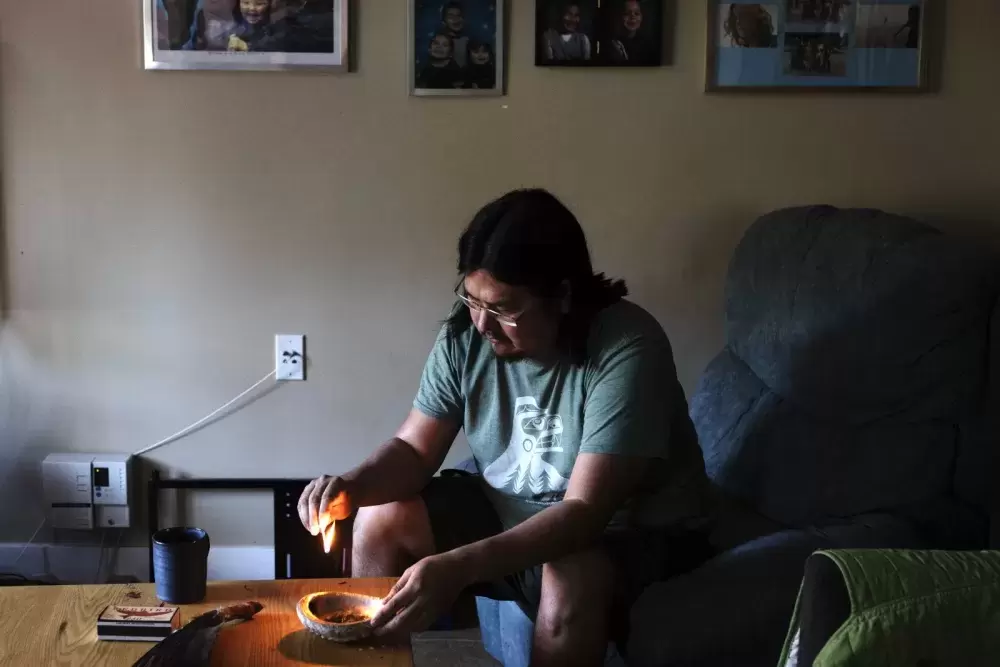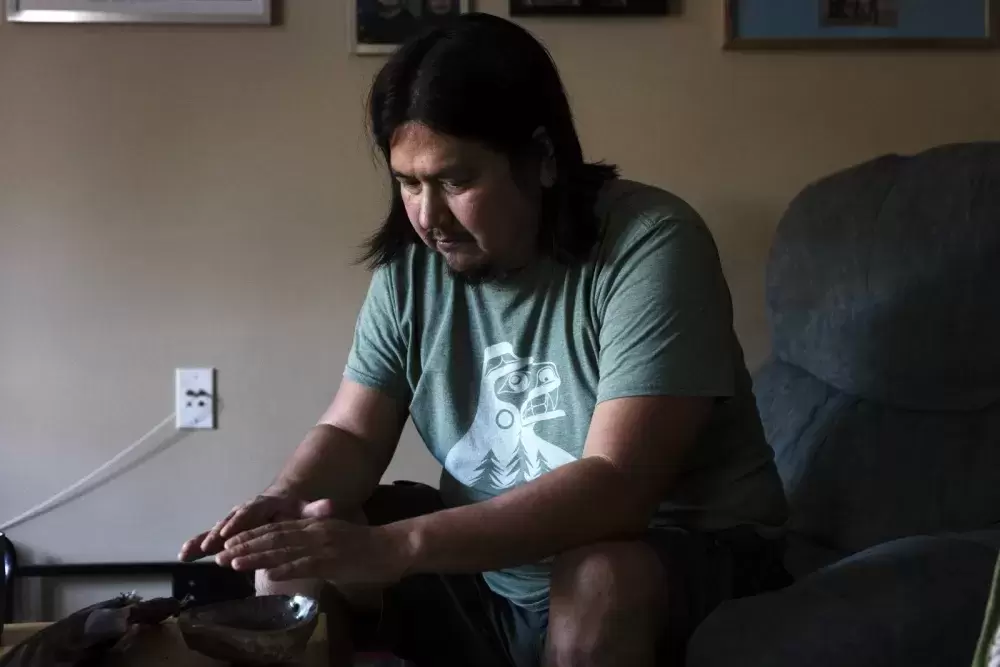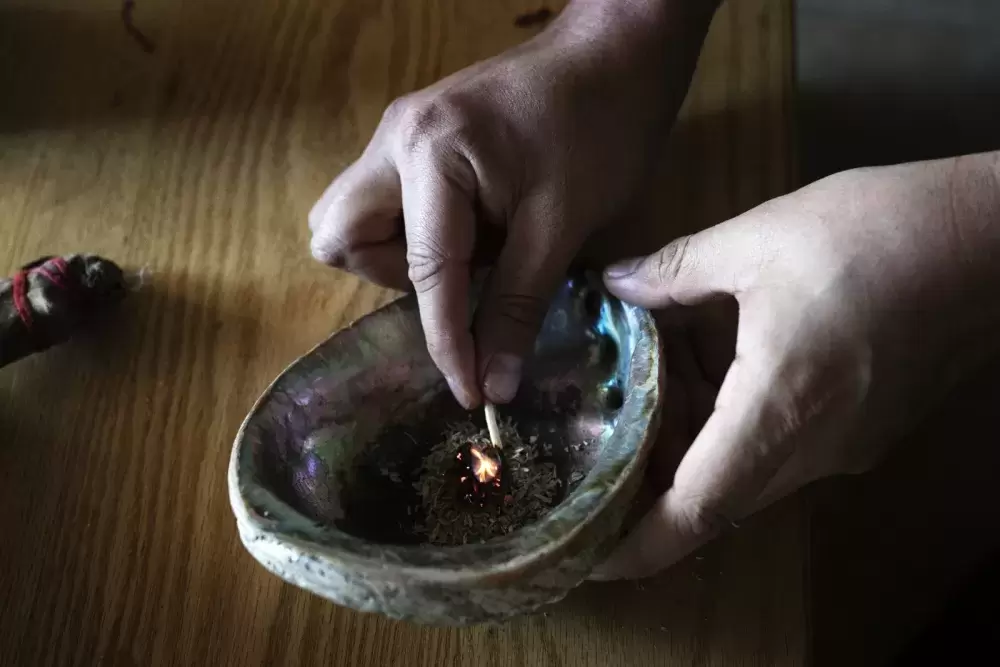For the majority of Steve Howard’s life, he lived by the phrase, “real men don’t cry.”
“Back in my day we were always taught not to cry,” he said. “We were always taught not to feel. So, we grew up kind of tough. Whatever we held in, we kept in.”
It’s a mindset that the Tla-o-qui-aht man is trying to shift by encouraging his four sons to openly share their feelings. And yet, his past traumas of physical, mental and sexual abuse continue to hold him back.
“We all have troubles and we all have flaws,” he said. “We don’t share our stories. Sexual abuse is a really big thing that happened to First Nations people – not just in Tla-o-qui-aht, but all over Canada and the United States. We as men don’t express that feeling of being raped, not just by a priest but by [our] own family members.”
Noticing a gap in men’s support, Howard, Chris Seitcher, Dwayne Martin, Craig Devine and William Goodbird formed a men’s group and started hosting informal men’s circles in Ty-Histanis in the Fall of 2017.
While they noticed options for women, youth and elders, there wasn’t a place for men to come together.
For Howard, the men’s circle provided him a safe space to share his story without fear of judgement. In turn, he encouraged the men around him to “feel strong enough to express who they are.”
“Everybody’s story helped my journey,” he said. “It’s the growth of knowing that I’m not alone in this world.”
In those early stages, the men’s group struggled to host regular circles because they didn’t have a consistent space to gather in. The setback meant attendance was scarce and yet its impact started to pulse throughout the nation.
“One of the key things that we noticed was it started a conversation in and around the community,” said Devine. “These men would [return] home from our men’s gathering and be totally high as a kite on the good vibe of everything. They brought that energy back home with them and their wives noticed it and their kids noticed it. We started really wanting to build on that.”
Eventually, the group of volunteers secured a space within the nation’s health centre and three to 18 men started regularly attending. Through sweats, brushings, singing, drumming and talking circles, the group aimed to integrate a more ancestral approach to dealing with trauma.
“We communicate our emotions in a different way, or the way that we were taught,” said Seitcher, Tla-o-qui-aht First Nation cultural support worker. "Sometimes expressing them will come out through yelling, swearing or causing harm to another person.”
While there is no excuse for that behaviour, Seitcher said the men’s group is trying to shift those forms of expression through connection and ceremony.
“If we are able to truly work on ourselves and truly heal, we are able to be in the moment,” he said. “We are able to live for today. We’re able to see and be connected with the people that we meet and talk to – with our families and loved ones. We won’t sit with the things that were done in the past. We won’t sit with the hurts that have happened in the past. It will come up – those hurts and those pains – but we have to allow it to flow through our bodies so that we can let it go.”
As momentum started to build, the First Nations Health Authority stepped in last year and provided a significant amount of funding for the group.
Despite being unable to gather due to COVID-19 restrictions, Seitcher, Devine and Naomi Seitcher, Tla-o-qui-aht First Nation community services manager, have been working to formalize the group, which has been named, ƛ̓iik̓pitap taqumł.
Levi Martin offered the name, which means “to build a solid foundation for the community.”
“It always makes me feel good when people are wanting to do something to make changes in themselves, in their families and communities,” he said.
They landed on the name because the structure of a house cannot stand without the foundation, said Seitcher.
“Each one of us in the community can be that foundation,” he said. “If one person heals, the hope is that the next person heals too. If we heal as a community, the next generation will be that much better off.”
By letting go of the past, Seitcher said the community will be able to “move forward in a good way.”
Looking ahead, ƛ̓iik̓pitap taqumł plans to provide an open, consistent space where Tla-o-qui-aht men can gather and grow through ceremony, health programming and cultural learning.
By supporting men in their healing journey through connection, Howard said the men’s group is a tool “to speak your mind.”
“A lot of us are too scared to speak,” he said. “But once you learn how to speak, then you learn how to stand. And once you learn how to stand, you learn how to walk. It’s learning how to move forward again.”



